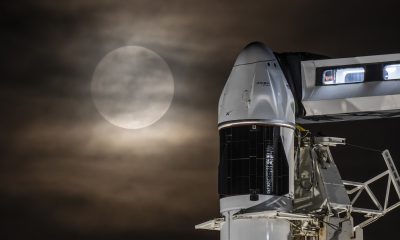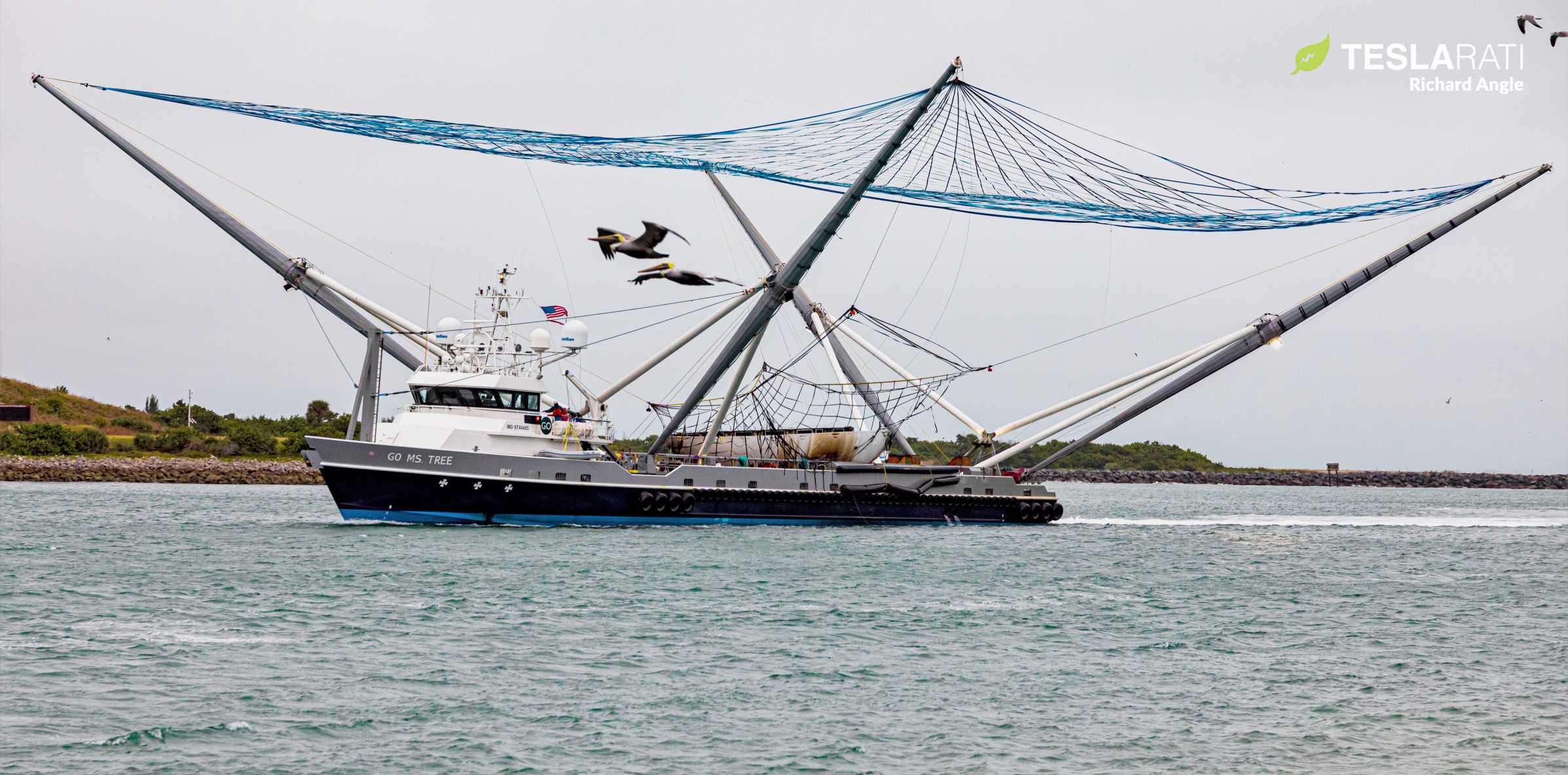

News
SpaceX fairing recovery ships return to port with Falcon 9 nosecone and battle scars
Four days after they headed out into the Atlantic Ocean, twin SpaceX fairing recovery ships Ms. Tree and Ms. Chief have returned to port with both halves of a Falcon 9 fairing, although they appear to have picked up some battle scars along the way.
Ms. Tree and its near-identical sibling Ms. Chief departed Port Canaveral on December 14th and arrived on station – 790 km (490 mi) off the coast of Florida – some 36 hours later. Each outfitted with a quartet of arms and pair of nets, it was the first time both ships successfully made it out into the Atlantic for a simultaneous fairing catch attempt, having been foiled by high seas during a prior November outing.
For unknown reasons, after the duo’s November false start, both ships stopped for almost two weeks at a South Carolina port, perhaps indicating that SpaceX was concerned about the structural integrity of the ships’ seemingly fragile net mechanism. In February 2019, Mr. Steven (now Ms. Tree) lost two of its four arms while heading downrange for an attempted catch, apparently broken off by pitching caused by high seas. Further strengthening the case that their net mechanisms are rather fragile, both Ms. Tree and Ms. Chief again suffered damage after their Kacific-1/JCSAT-18 Falcon 9 fairing recovery attempt.
Both ships arrived back at Port Canaveral on December 18th and were caught by Teslarati photographer Richard Angle while passing through the narrow mouth of the port. GO Ms. Chief took the lead, revealing a Falcon 9 fairing half snugly secured with a tarp on her deck – the ship’s very first launch vehicle hardware recovery.
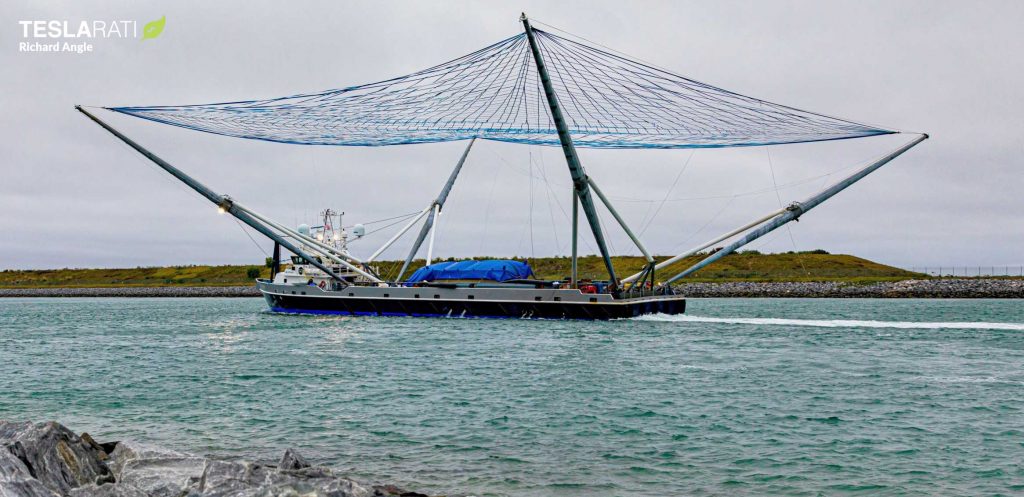
First (partially) successful fairing recovery quite literally under wraps, Ms. Chief nevertheless did not make it through the rite of passage unscathed. Oddly, it appears that just one of the ship’s eight white arm supports is missing (the rear right or aft starboard arm), visibly resulting in the arm slouching a bit compared to its siblings. Intriguingly, it appears that the arm is partially stretching – and thus potentially resting on – Ms. Chief’s net and rigging.
The fact that only one of the arm’s two beams (of eight total) seems to have failed is more immediately indicative of possible human error during installation or a defective attachment mechanism, although it’s entirely possible that a fluke of weather could have damaged just the one beam.
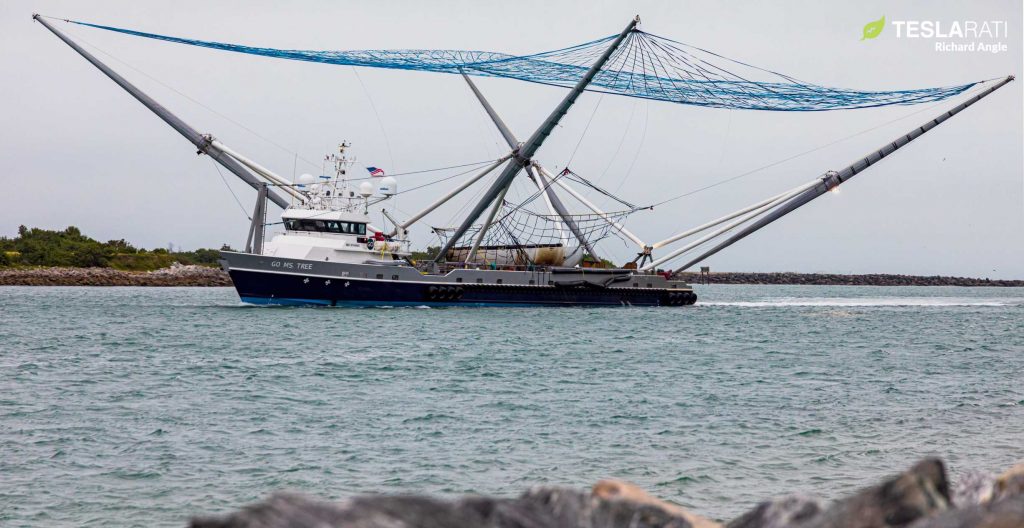
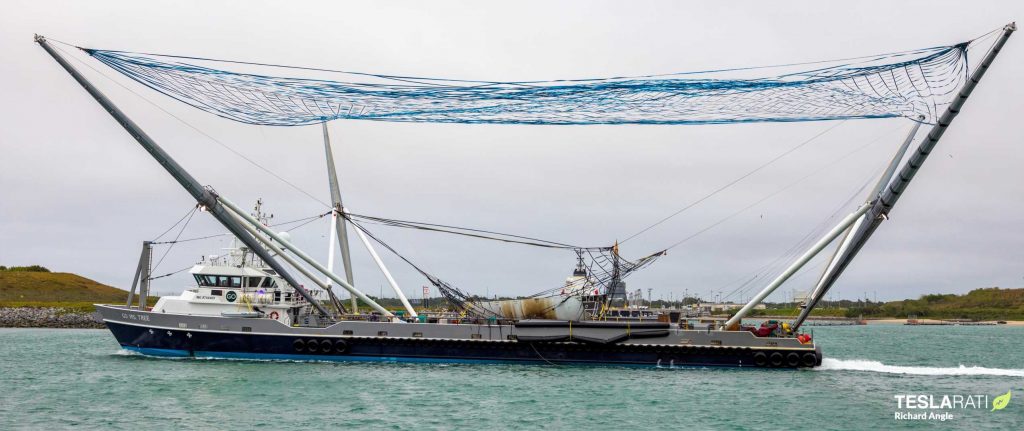
Thankfully, Ms. Tree (formerly Mr. Steven) appears to have made it through the recovery mission with all four arms fully intact, although the ship clearly struggled with a separate mechanism. Notably, Ms. Tree seems to have struggled to use its secondary net to lift its fairing half out of the sea and onto her deck, with that smaller net clearly suffering a multitude of rips and tears at some point during the process. Her recovered fairing half is somewhat awkwardly strewn on the deck with no obvious attempt to rectify the issue, indicating that the net may have torn mid-lift, causing the fairing to fall maybe 5-10 feet.
If it did actually fall onto Ms. Tree’s deck, that will almost certainly be visible in the form of damage to its aluminum-composite honeycomb structure and white insulation coating.
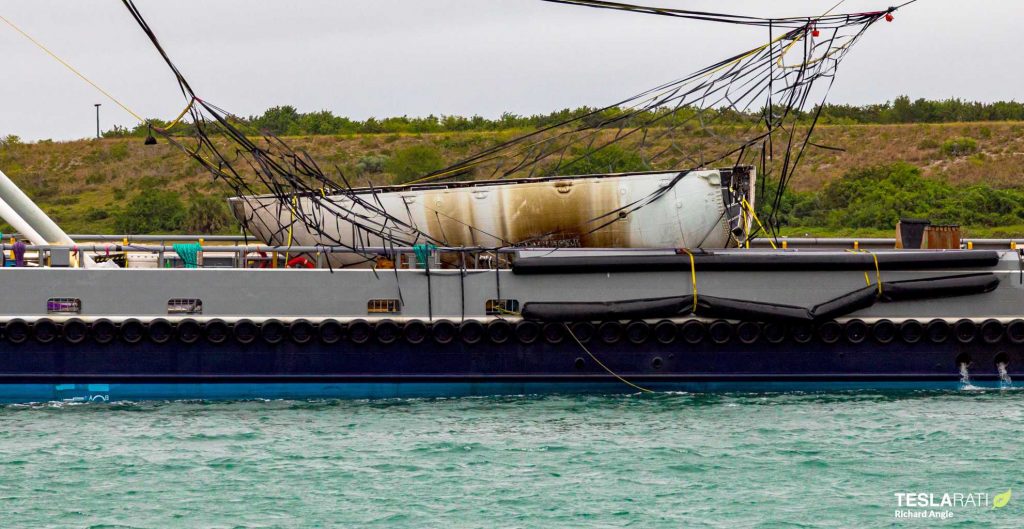
Ultimately, fairing recovery continues to prove itself to be a major challenge, although SpaceX obviously has no intention of giving up. With two successful catches already in hand, it’s clear that fairing recovery is undeniably possible and is more a matter of tweaking existing systems than starting from scratch. Much like Falcon 9 booster recovery had and its fair share of failed landings even after the first success, it will likely take quite a while for SpaceX to optimize fairing recovery to the point that it can be considered reliable.
For now, routine fairing recovery and reuse will likely continue to be Falcon 9’s white whale, at worst adding to the excitement of every SpaceX satellite launch.
Check out Teslarati’s Marketplace! We offer Tesla accessories, including for the Tesla Cybertruck and Tesla Model 3.
Elon Musk
Why Tesla’s Q3 could be one of its biggest quarters in history
Tesla could stand to benefit from the removal of the $7,500 EV tax credit at the end of Q3.

Tesla has gotten off to a slow start in 2025, as the first half of the year has not been one to remember from a delivery perspective.
However, Q3 could end up being one of the best the company has had in history, with the United States potentially being a major contributor to what might reverse a slow start to the year.
Earlier today, the United States’ House of Representatives officially passed President Trump’s “Big Beautiful Bill,” after it made its way through the Senate earlier this week. The bill will head to President Trump, as he looks to sign it before his July 4 deadline.
The Bill will effectively bring closure to the $7,500 EV tax credit, which will end on September 30, 2025. This means, over the next three months in the United States, those who are looking to buy an EV will have their last chance to take advantage of the credit. EVs will then be, for most people, $7,500 more expensive, in essence.
The tax credit is available to any single filer who makes under $150,000 per year, $225,000 a year to a head of household, and $300,000 to couples filing jointly.
Ending the tax credit was expected with the Trump administration, as his policies have leaned significantly toward reliance on fossil fuels, ending what he calls an “EV mandate.” He has used this phrase several times in disagreements with Tesla CEO Elon Musk.
Nevertheless, those who have been on the fence about buying a Tesla, or any EV, for that matter, will have some decisions to make in the next three months. While all companies will stand to benefit from this time crunch, Tesla could be the true winner because of its sheer volume.
If things are done correctly, meaning if Tesla can also offer incentives like 0% APR, special pricing on leasing or financing, or other advantages (like free Red, White, and Blue for a short period of time in celebration of Independence Day), it could see some real volume in sales this quarter.
You can now buy a Tesla in Red, White, and Blue for free until July 14 https://t.co/iAwhaRFOH0
— TESLARATI (@Teslarati) July 3, 2025
Tesla is just a shade under 721,000 deliveries for the year, so it’s on pace for roughly 1.4 million for 2025. This would be a decrease from the 1.8 million cars it delivered in each of the last two years. Traditionally, the second half of the year has produced Tesla’s strongest quarters. Its top three quarters in terms of deliveries are Q4 2024 with 495,570 vehicles, Q4 2023 with 484,507 vehicles, and Q3 2024 with 462,890 vehicles.
Elon Musk
Tesla Full Self-Driving testing continues European expansion: here’s where
Tesla has launched Full Self-Driving testing in a fifth European country ahead of its launch.

Tesla Full Self-Driving is being tested in several countries across Europe as the company prepares to launch its driver assistance suite on the continent.
The company is still working through the regulatory hurdles with the European Union. They are plentiful and difficult to navigate, but Tesla is still making progress as its testing of FSD continues to expand.
Today, it officially began testing in a new country, as more regions open their doors to Tesla. Many owners and potential customers in Europe are awaiting its launch.
On Thursday, Tesla officially confirmed that Full Self-Driving testing is underway in Spain, as the company shared an extensive video of a trip through the streets of Madrid:
Como pez en el agua …
FSD Supervised testing in Madrid, Spain
Pending regulatory approval pic.twitter.com/txTgoWseuA
— Tesla Europe & Middle East (@teslaeurope) July 3, 2025
The launch of Full Self-Driving testing in Spain marks the fifth country in which Tesla has started assessing the suite’s performance in the European market.
Across the past several months, Tesla has been expanding the scope of countries where Full Self-Driving is being tested. It has already made it to Italy, France, the Netherlands, and Germany previously.
Tesla has already filed applications to have Full Self-Driving (Supervised) launched across the European Union, but CEO Elon Musk has indicated that this particular step has been the delay in the official launch of the suite thus far.
In mid-June, Musk revealed the frustrations Tesla has felt during its efforts to launch its Full Self-Driving (Supervised) suite in Europe, stating that the holdup can be attributed to authorities in various countries, as well as the EU as a whole:
Tesla Full Self-Driving’s European launch frustrations revealed by Elon Musk
“Waiting for Dutch authorities and then the EU to approve. Very frustrating and hurts the safety of people in Europe, as driving with advanced Autopilot on results in four times fewer injuries! Please ask your governing authorities to accelerate making Tesla safer in Europe.”
Waiting for Dutch authorities and then the EU to approve.
Very frustrating and hurts the safety of people in Europe, as driving with advanced Autopilot on results in four times fewer injuries!
Please ask your governing authorities to accelerate making Tesla safer in Europe. https://t.co/QIYCXhhaQp
— Elon Musk (@elonmusk) June 11, 2025
Tesla said last year that it planned to launch Full Self-Driving in Europe in 2025.
Elon Musk
xAI’s Memphis data center receives air permit despite community criticism
xAI welcomed the development in a post on its official xAI Memphis account on X.

Elon Musk’s artificial intelligence startup xAI has secured an air permit from Memphis health officials for its data center project, despite critics’ opposition and pending legal action. The Shelby County Health Department approved the permit this week, allowing xAI to operate 15 mobile gas turbines at its facility.
Air permit granted
The air permit comes after months of protests from Memphis residents and environmental justice advocates, who alleged that xAI violated the Clean Air Act by operating gas turbines without prior approval, as per a report from WIRED.
The Southern Environmental Law Center (SELC) and the NAACP has claimed that xAI installed dozens of gas turbines at its new data campus without acquiring the mandatory Prevention of Significant Deterioration (PSD) permit required for large-scale emission sources.
Local officials previously stated the turbines were considered “temporary” and thus not subject to stricter permitting. xAI applied for an air permit in January 2025, and in June, Memphis Mayor Paul Young acknowledged that the company was operating 21 turbines. SELC, however, has claimed that aerial footage shows the number may be as high as 35.
Critics are not giving up
Civil rights groups have stated that they intend to move forward with legal action. “xAI’s decision to install and operate dozens of polluting gas turbines without any permits or public oversight is a clear violation of the Clean Air Act,” said Patrick Anderson, senior attorney at SELC.
“Over the last year, these turbines have pumped out pollution that threatens the health of Memphis families. This notice paves the way for a lawsuit that can hold xAI accountable for its unlawful refusal to get permits for its gas turbines,” he added.
Sharon Wilson, a certified optical gas imaging thermographer, also described the emissions cloud in Memphis as notable. “I expected to see the typical power plant type of pollution that I see. What I saw was way worse than what I expected,” she said.
-

 Elon Musk3 days ago
Elon Musk3 days agoTesla investors will be shocked by Jim Cramer’s latest assessment
-

 News1 week ago
News1 week agoTesla Robotaxi’s biggest challenge seems to be this one thing
-

 News2 weeks ago
News2 weeks agoTexas lawmakers urge Tesla to delay Austin robotaxi launch to September
-

 Elon Musk2 weeks ago
Elon Musk2 weeks agoFirst Look at Tesla’s Robotaxi App: features, design, and more
-

 Elon Musk2 weeks ago
Elon Musk2 weeks agoxAI’s Grok 3 partners with Oracle Cloud for corporate AI innovation
-

 News2 weeks ago
News2 weeks agoWatch Tesla’s first driverless public Robotaxi rides in Texas
-

 News2 weeks ago
News2 weeks agoSpaceX and Elon Musk share insights on Starship Ship 36’s RUD
-

 News2 weeks ago
News2 weeks agoTesla has started rolling out initial round of Robotaxi invites










